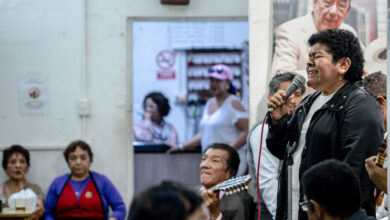Peru: In Addition to Political Crisis, on Health Alert
The UN Estimates that Ten Million Peruvians Have Their Health at Risk Due to Water Contamination With Toxic Substances

Photo: Pixabay
LatinAmerican Post | María Fernanda Ramírez Ramos
Listen to this article
Leer en español: Perú: además de crisis política, en alerta sanitaria
Peru is not only experiencing a strong political crisis, but is facing a growing danger to the health of its population that has caused the United Nations to raise alarms about the situation. In the Andean country, today 31.15% of the population is exposed to a silent threat: water contamination. The UN special rapporteur for the right to drinking water and sanitation released a statement this week, warning that more than ten million Peruvians ingest toxic substances such as heavy metals in the water. This constitutes a problem that endangers the health of the population today and in the future.
“I thought I knew Peru in its tremendous diversity, but this time I have experienced that diversity, both in the coastal strip, as rich in fishing as it is in the desert, where most of the population lives, and in the rugged mountain range, where indigenous peoples and Andean peasant communities preserve ancestral cultures and take care of the rivers on which life depends on the coast, and in the exuberant Amazonian territory, where water is abundant and indigenous peoples struggle to survive between the oblivion of many and the greed of some", narrates Pedro Arrojo-Agudo, the aforementioned rapporteur, in his observations.
The conclusions of his investigation indicate that it is an issue originated by mining companies and that the causes lie in decades of mismanagement. Likewise, it indicates that the majority of the affected population is indigenous or peasant, and the defenders of water have been systematically violated. In this sense, half of the populations of Pasco, Puno, Amazonas, Callao, Madre de Dios, Moquegua, Cusco, Ucayali and 100% of the population of Lambayeque drink contaminated water.
This, in addition to being an urgent health and environmental emergency, is a violation of the human rights of the population. "Nobody told us that the water was contaminated, but my son's anemia and health problems were finally explained when they did blood tests and high levels of heavy metals came out. Although I boil and filter the water they give us, it always torments me the idea of whether I am poisoning my son", is a testimony from a woman from Puno who collected the communication. Likewise, it cites testimonies from midwives, priests, and peasants from the affected areas who tell first-hand of the damage caused by the irresponsibility of the mining companies. In this regard, abortions and malformations in babies have increased, and diseases in adults related to the presence of heavy metals in the blood.
Some regions are more affected than others
The Cajamarca region is one of the most affected by the situation of water contamination. In fact, the Atlas of Environmental Justice indicates that there are more than a dozen environmental conflicts in the area due to extractivism. A 2018 Mongabay investigation also found that mining strongly impacts the Huánuco, Loreto, Madre De Dios, Pasco and Ucayali regions. "Based on the analysis of hundreds of data from state institutions and civil organizations, we established that 1,247 communities, titled and untitled, are critically impacted by illegal mining, illicit coca leaf crops, and deforestation."
Thus, it is a situation that perpetuates violence against the communities that have been most unprotected by the Peruvian state. "The visit to the Cajamarca Region confirmed the seriousness of these effects on the health of the population due to mining activities. Beyond the seriousness of environmental damage, with the drying up of lagoons, wetlands and springs, disappearance of species and mortality of fish, the blood tests promoted by the municipality of Bambamarca, which reveal heavy metals in 100% of its inhabitants, are alarming," said the UN rapporteur's report.
On the other hand, Arrojo-Agudo points out that Peru is extremely vulnerable to climate change in terms of water and sanitation, which is exacerbated by the extractivist model and which urgently needs to be corrected. Likewise, it points out 8 challenges in which it is urgent to work, such as social and territorial discrimination, the non-participation of women, the criminalization of social protest and the need for community and inclusive water management. All these recommendations and investigation of the situation will be presented in 2023 to the United Nations Human Rights Council.
Among the recommendations delivered are stopping new mining concessions in basin headwaters and "effectively implementing the Basin Headwater Protection Law, guaranteeing the effective participation of the populations involved." Likewise, it is urgent to meet the needs for drinking water and prioritize this over economic gain.




